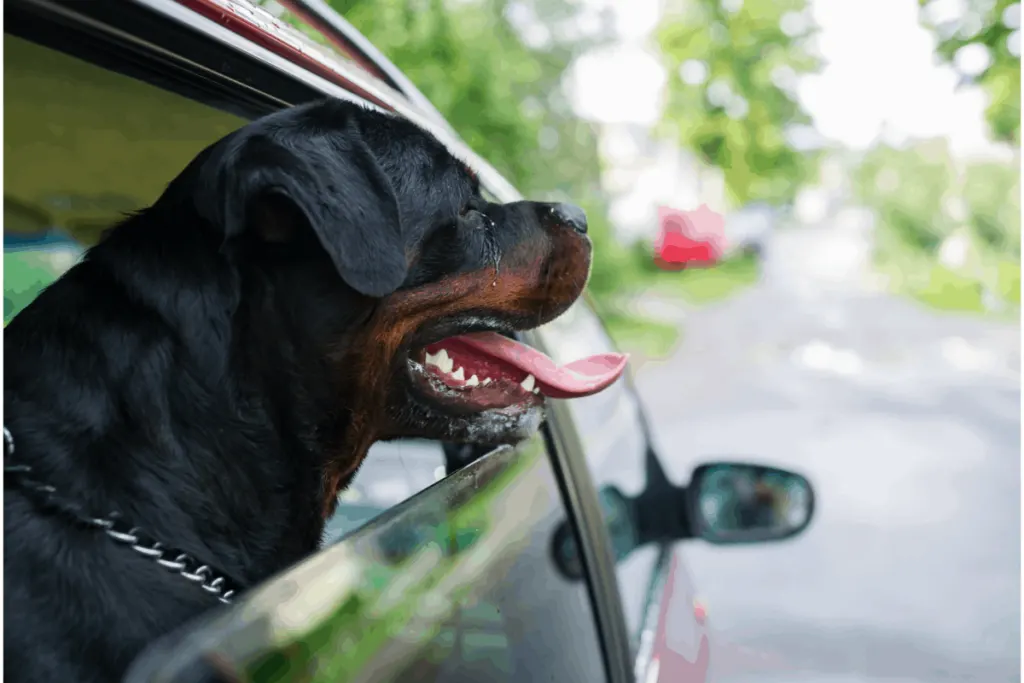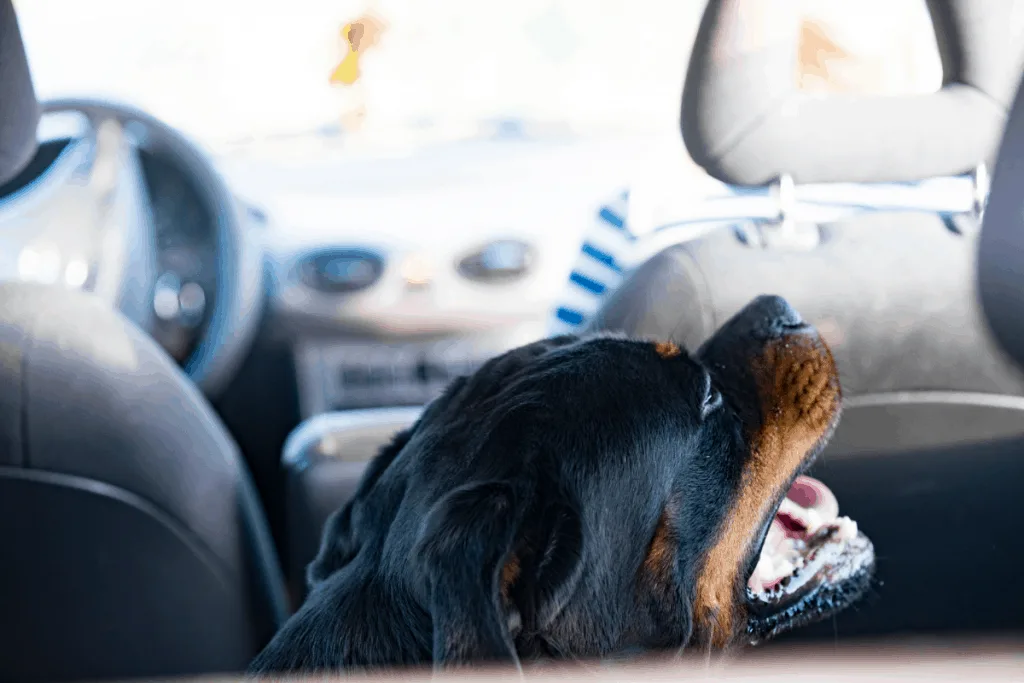
Taking your Rottweiler in a car is unavoidable. There will, at least, be a regular trip to the veterinarian clinic for a check-up.
When your Rottweiler struggles with car sickness, these trips become stressful and uncomfortable for both them and you, so is there something you can do to help?
Rottweilers get car sick from conflicting sensory signals, stress, or fear. The vestibular system plays a big role, so car sickness is worse in puppies whose ears are still developing and in dogs with vestibular disease. Desensitization, restraint, or medication, can help lessen or stop car sickness.
Drooling, lip-licking, pacing, whining, vomiting, and diarrhea—these are the signs that your Rottweiler is car sick, and it means that neither you nor your dog will enjoy car journeys (and the aftermath).
So first, let’s look at why Rottweilers get car sick, and then we can discuss how to help them.
Click Here to Jump to a Section
What Causes Car Sickness in Rottweilers?
Car sickness is ultimately the result of too much stimulation related to the motion of the car, but this can take two different forms: too much physical stimulation and too much emotional stimulation.
Overload of Physical Stimulation Causes Car Sickness in Rottweilers
When driving in a car, your Rottweiler’s body, eyes, and ears (vestibular system) are all receiving sensory signals, and these do not always match up, so the brain can get confused.
This leads to car sickness.
The vestibular system seems to play the most significant role in whether or not your Rottweiler will feel car sick. This is why a young Rottweiler is more likely to struggle with car sickness than an adult; their ear structures are still developing.
So, if you have a Rottweiler puppy who is throwing up every time you drive it to the park or the vet, don’t get despondent; the chances are that they will grow out of their car sickness by the time they are one year old.
However, not all Rottweilers will grow out of their car sickness.
They can be perfectly healthy otherwise, but their brains just don’t learn to adjust to the conflicting signals.
In other cases, car sickness is actually a symptom of vestibular disease, which can then be remedied by addressing the underlying medical condition.
Overload of Emotional Stimulation Causes Car Sickness in Rottweilers
If your Rottweiler is very anxious and scared to go in the car, then they can also become car sick.
They will already be feeling physically distressed from the anxiety or fear. Then the sensory stimuli of a moving car will overwhelm them, and their brain will be less able to process and cope with the information it is receiving.
As you can imagine, if your Rottweiler gets car sick, they will automatically feel more anxious or afraid about going in the car, which creates a vicious cycle.
How Do You Help a Rottweiler With Car Sickness?

Check for Vestibular Disease
The first thing that you want to do is to take your Rottweiler to the veterinarian and check that they are healthy and that the car sickness is not the result of vestibular disease (or any other medical condition).
Unfortunately, this requires two car rides, but it’s still worth it.
Vestibular disease does not just cause car sickness, it can lead to many other problems, and if not treated early enough, some viruses and bacteria can cause permanent damage.
Desensitize Your Rottweiler to Car Rides
The more often you take your Rottweiler for rides in the car, the more opportunities your dog’s body has to adjust and learn how to cope with car sickness.
If you have car sickness, then you have learned over time what helps and what does not. While your Rottweiler can’t do things like put on sunglasses, they can still adapt in other ways.
Additionally, more frequent car rides can help your Rottweiler to overcome fear and anxiety associated with going in the car, but only if the desensitization process is handled correctly.
Patience is absolutely vital to desensitization, and it can take a lot of time, but it can also really pay off.
How to Desensitize Your Rottweiler to Car Rides
Start by getting them to sit in the stationary car for a few minutes.
You can start with the door open and then close it when they are comfortable, but you should never lock your Rottweiler in the car alone. You must always be in there with them.
Restrain Your Rottweiler in the Car
Your Rottweiler will benefit from standing or sitting still while in the car. Rushing from one window to the next or being bumped about as you brake and accelerate are exacerbating physical stimuli for car sickness.
There are various ways to restrain your Rottweiler during car rides.
Dog Seat Belts
The first option is a dog seat belt, such as the one from Felyong (available on Amazon).
These seat belts have a normal leash clip on one end, which you will attach to your Rottweiler’s harness. The other end has a seat belt metal insert, which should fit into most normal seat belt buckles.
The great thing about dog seat belts is that they are adjustable, so they will keep your Rottweiler puppy still just as well as it will do for your adult Rottweiler.
Travel Crates
The second option is to get your Rottweiler a travel crate.
Your Rottweiler will have to be crate trained so that they will view their crate as a safe place, reducing anxiety in addition to restraining their movements.
If you try to use a travel crate without first crate training your Rottweiler, you can increase their car ride anxiety.
You will probably have to get a smaller crate for your puppy and then purchase a second and larger crate if your Rottweiler continues to get sick in the car as an adult.
A puppy in an adult crate is not going to be well restrained.
Dog Car Seats
Most doggy car seats are designed for dogs that are much smaller than a Rottweiler, but they can still be used for puppies.
Also, as mentioned, your Rottweiler is likely to grow out of their car sickness, so this might be all you need.
Let Your Rottweiler Look Out of the Car Window
If your Rottweiler’s eyes can see what is happening, then it can provide more information to the brain and will allow a more accurate interpretation of what is happening.
This can help to reduce car sickness, as well as provide your Rottweiler with a sense of ease while traveling in your car or truck.
Open a Window for Your Rottweiler
You can open a window slightly for your Rottweiler—but not enough for them to get any part of their body outside of the vehicle!
The open window helps to equalize the pressure in the car and, therefore, your Rottweiler’s ears, which can help to settle the vestibular system.
Furthermore, the fresh and moving air might help them to feel less nauseous.
Try Medications if Your Rottweiler’s Car Sickness Is Really Bad
Always discuss the use of medication with your Rottweiler’s veterinarian before using anything, even if it is a natural medicine.
Some natural medicines you can try include:
- Ginger
- Lavender (aromatherapy NOT ingestion)
- Adaptil (pheromones)
- Solliquin calming supplement
It is worth talking a little more about Soliquin. This supplement is not only effective for car sickness, but its ability to keep your dog calm extends to many other potentially stressful events, including fireworks and thunderstorms.
Solliquin is available for a reasonable price on Amazon – take a look for yourself to see if it’s something that may interest you.
Additionally, there are a few different pharmaceutical medications that you can try if your dog needs something stronger. These include:
- Cerenia
- Meclizine
- Benadryl (no combination products—it must only contain Benadryl as the active ingredient)
Before we conclude, you may be interested in watching the following video. It sums up what we’ve talked about and adds a few finer points about dog psychology that are very useful!
Final Thoughts
When your Rottweiler feels car sick, it can make any trip, even a short one with a happy destination like the park, a bit of a nightmare.
Your dog doesn’t feel nice, and you may end up having to clean up vomit or diarrhea.
Car sickness occurs when your Rottweiler’s brain is overwhelmed by conflicting sensory signals in the moving car or when they are very anxious or afraid while in the car.
Happily, you Rottweiler’s car sickness does not have to dictate its life or yours; you don’t have to cancel fun trips or dog-friendly vacations.
Dogs often out-grow car sickness after a year.
You can also desensitize them to car rides, restrain them while in the car, let them look out the window, crack the window, or try some veterinarian-recommended medications.
